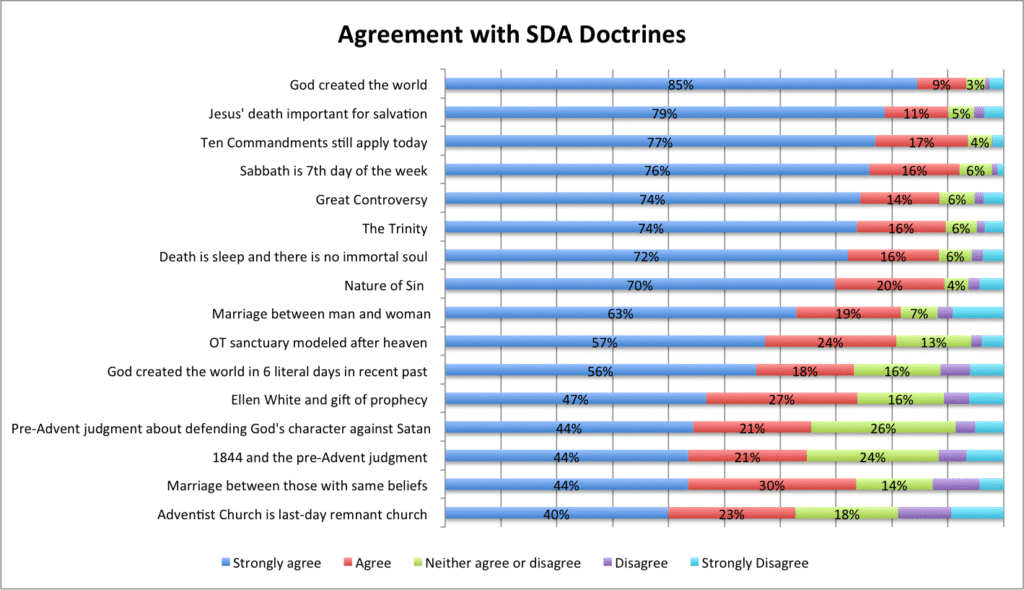How connected are Adventist college graduates to the Seventh-day Adventist Church? This was the subject of a 2012-13 study commissioned by the General Conference of the Seventh-day Adventists, led by Dr. Douglas Jacobs from Southern Adventist University with a team of researchers from Oakwood and Southern Adventist Universities. Over one thousand recent graduates from both universities and Pacific Union College participated in the study. A majority of participants (59%) were under 30 years of age and about one-third (32%) between 30-34. More than half (54%) were married.
The research findings yielded rich data about what helps young adults to be connected with the SDA Church, what kind of local churches they prefer to attend, how regular their personal devotions are, and other issues. Overall, contrary to the common belief, the results show that there is a large group among recent graduates that feels connected to and supportive of the SDA Church. A strong majority (86%) reported SDA Church affiliation. More than 71% attended church at least once a week.
There are also some areas where results are not what church leaders might hope for. Thus, only 47% of participants had their membership in the church they actually attended, 39% had it in the church they grew up in or previously attended, 8% were members in university church or other, and 3% did not know where it was at that time. Obviously, the transitory life style of young adults makes it difficult for a local church to provide adequate care for young adults and contributes to the problem of their retention. Equally, it seems that many young people may not fully commit to a local church community.

The findings also showed that recent graduates prayed more often than they read the Bible or read Ellen White’s works. A majority (67%) prayed once or several times a day, while only 30% read the Bible at least once a day and even fewer (9%) read Ellen White’s works daily. However, in addition to these respondents, 38% report that they read the Bible once or several times a week, and 23% read Ellen White’s works several times or once a week.
Most SDA doctrines received strong support from survey respondents. The three doctrines that received the highest percentage of “strong agreements” were that God created the world (85%), salvation through Jesus’s death (79%), and the continuing relevance of Ten Commandments (77%). In contrast, less than half strongly agreed that the pre-advent judgement defends the character of God against Satan’s accusations (45%), that since 1844 Jesus has been conducting a pre-advent judgement while He continues His work of forgiving sins (44%), and that the SDA Church is God’s last-day church with a message to prepare the world for the Second Coming of Jesus (40%). These three beliefs not only had the lowest scores of “strongly agree” but also the lowest combined aggregates for “strong agree” and “agree”: 66%, 65%, and 63% respectively.
Two other beliefs with which less than half of survey respondents agreed were “God gave Ellen White the gift of prophecy” and “Marriage is a loving union that should be entered into only by people who share the same beliefs.” However, combining strong agreement with agreement, over two-thirds (74% each) strongly agreed or agreed on these points. Regarding the Adventist doctrine on marriage, 82% strongly agreed or agreed that marriage was established by God to be a lifelong, loving union between a man and a woman.

Interestingly, the research results indicated that there was an obvious correlation between the participants’ devotional life and their acceptance of SDA doctrines and lifestyle. Regular devotional life is an important factor in membership retention and connectedness to the church. It can also be a bridge to a personal relationship with Jesus. Remarkably, in this study although 87% agreed or strongly agreed that God was actively working in their lives, only 59% agreed or strongly agreed that they had a vibrant, personal relationship with Christ.
More information about this research, the updated report, and its Executive Summary can be found here.
Created in collaboration with the Institute of Church Ministry.

